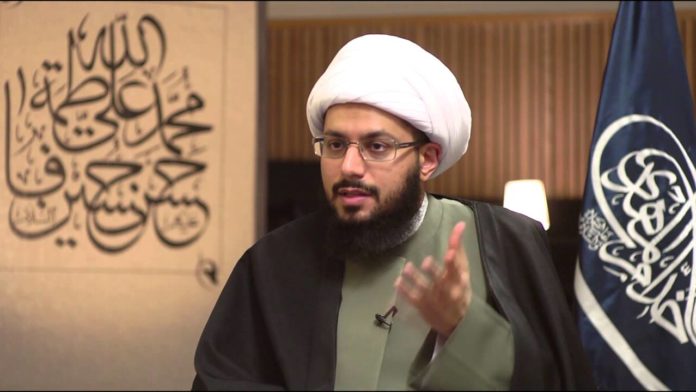The scriptwriter behind the blasphemous Lady of Heaven movie is Yasser Al-Habib, an extremist Kuwaiti Shia who is exiled in the United Kingdom.
Over the last decade Al-Habib has become notorious in the Arabic-speaking world for his targeting of the Prophet Muhammad’s (pbuh) wife Aisha (ra), as well as the first two caliphs Abu Bakr and Omar (ra).
He is now becoming better known in the Anglophone world with the release of his anti-Sunni sectarian movie Lady of Heaven which has sparked protests all over the country.
But who exactly is Yasser Al-Habib and what are his views?
Early life
According to his website, Al-Habib was born in 1979 in Al-Mirqab, Kuwait.
He studied at the Faculty of Political Sciences at Kuwait University, then went on to religious studies in 1995 in Qom, Iran, where he studied under the supervision of Sayed Muhammad Ridha al-Shirazi.
Subscribe to our newsletter and stay updated on the latest news and updates from around the Muslim world!
Al-Habib started his career in the field of media at a young age. In 1990, at the age of 12, he began to work as an editor for the Kuwaiti newspaper, al-Watan. He also worked at the Sawt al-Kuwait newspaper, The Forefront, The Public Opinion, al Qabas, and The Voice of the Gulf.
The Mahdi Servants organisation and prison
In 1999, Al-Habib founded The Mahdi Servants Organisation in Kuwait to establish a “Rafida global voice and movement and a revival of the Rafida Shi’a faith.”
The aim was to cultivate a future generation of Shi’a that would be “courageous in promoting the truth, more confident and capable, scientifically and culturally aware, and proficient in the art of communication and propagation,” his website says.
But his outspokenness caught the attention of representatives in the Kuwaiti National Assembly who demanded the suspension of the activities of The Mahdi Servants Organisation.
This led to the arrest and imprisonment of Al-Habib in 2003 where the courts ruled a maximum penalty of a one-year sentence with a fine of one thousand dinars.
Further pressure led the courts to upgrade the case to a felony and then again to a state security case. This allowed courts to increase the sentence by ten years in 2004, with another ten years increase in 2006, and another ten years increase in 2012, resulting in a total of a fifteen years imprisonment sentence.
Al-Habib and his children were also stripped of Kuwaiti nationality.
Release from prison
After two months in prison, Al-Habib was informed that he would be released through a pardon by the Emir of Kuwait.
The Kuwaiti government later acknowledged during parliamentary questions and in response to the U.S. State Department’s report on human rights, that the release of Al-Habib was a “procedural mistake” and it was unknown how the error occurred.
He soon crossed the border into Iraq staying in the cities Najaf, Karbala, Kadhimiya, Smarra, Balad, and Baghdad.
After a period living in Iraq, Al-Habib moved to Iran, visiting the cities of Mashhad, Qom, Rayy and Kashan.
In 2005 he decided to migrate to Britain, where he obtained the right of asylum. In London he re-established The Mahdi Servants Organisation in Kilburn, before moving to Cricklewood, and then to a more sizable location in Wembley.
In 2010 he launched Fadak TV from where “the voice of the Rafida was able to reach the globe for the first time, airing programs in Arabic, English, Farsi and French.”
Since 2010 he has published many works, including books attacking Aisha (ra) and Abu Bakr (ra) arguing that modern terrorism stems from them (audhubillah).
In 2012 he moved his headquarters to an undisclosed location on the western outskirts of London which is now home of the official Headquarters of The Mahdi Servants Union, Fadak Media Broadcasts, The Rafida Foundation, and Enlightened Kingdom Production.
It was under the umbrella of The Mahdi Servants Union that Enlightened Kingdom Production developed the blasphemous feature film The Lady of Heaven. An announcement of the successful completion of the film came at the end of 2020, with the release of the official poster and trailer.
Views
Al-Habib refers to Sunnis as “Bakris,” meaning the followers of Abu Bakr (ra). He says that the real Sunnis are the ones who follow the Sunnah of Muhammad, that is Shia Muslims.
He also refers to those whom claim to be Shi’a but do not denounce Sahaba as “Batris.”
In October 2010, Iranian Supreme Leader Ayatollah Ali Khamenei tried to calm tensions between Shias and Sunnis by issuing a fatwa against insulting Prophet Muhammad’s (pbuh) companions and wives.
Al-Habib responded by calling the Islamic Republic of Iran “oppressive.” He said the Iranian government was “oppressive” because the “regime in Iran today unjustly arrests anyone who celebrates the occasion of Farhat-ul-Zahra (end of Karbala mourning period) and prevents people from visiting the tomb of Abu Lulu, the killer of Omar (ra).
Senior Iranian cleric Naser Makarem Shirazi has referred to Al-Habib as a “hired agent or a mad man” and stated: “Recently, an illiterate fool, non-clergy U.K citizen in the name of Shia has insulted sacred matters of Sunni Muslim brothers.”



















